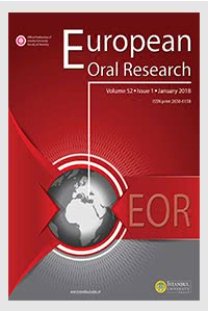ÇİĞNEME FONKSİYONUNA GİREN AMALGAM DOLGULU DİŞLERDEN VE RETROGRAD AMALGAM DOLGULARDAN KAN VE İDRARA CİVA GEÇİŞİNİN İNCELENMESİ
Amalgam, civa, çiğneme fonksiyonu
___
- Kenneth J., Mjör IA. Response to pa tients who require about the safety of den tal amalgam. Quintessence Int, 1991; 22: 249-50.
- Skoner JR, Wallace JA, Fochtman F., et all. Blood mercury levels with amalgam Oral lichen planus and contact allergy to retroseals: a longitudinal study. J Endod, mercury. Int J Oral Surg, 1982; 11: 236-39. 1996; 22: 140-41.
- Abraham J., Svare C., Frank C. The effects of dental amalgam restorations on dental materials. Int Dent J, 1986; 36: 30-34. blood mercury levels. J Dent Res, 1984; 63(1): 71-73.
- Ahlqwist M., Bengtsson C., Frunes B., Number of malgam tooth fillings in relation to subjectively expressed symptoms in a stuy of Swedish women. Community Dent Oral Epidemiol, 1988; 16: 227-31.
- Axell T., Nilner K.,Nilsson B. Cli nical Evaluation of patients reffered with M . : Clinical study of patients referred for symptoms related to oral galvamism. Sweed Den J, 1983; 7: 169-78.
- Begererow J., Zander D., Freier I . , Duı nemann L. Long-term mercury excrettion in Arch Occup Health, 1994; 66: 209-12.
- Boyd ND, Benediktsson MJ, Vimy DE, Hooper and Lorscheider FL. Mercury from dental "silver" tooth fillings impairs sheep kidney function. Am J Physiol, 1991; 261: 1010-14.
- Hanson M . Amalgam hazards in your teeth. J Orthomolecular Psychiatry, 1983; 12(3): 194-201.
- Eggleston DW, Nylander M. Corelation of dental amalgam with mercury in brain tissue. J Prosth Dent, 1987; 58: 704-06.
- Langan F., The use of Mercury in dentistry: a critical review of the literature.
- Eti S., Weisman R., Hoffman R., Re- idenberg M M : slight renal effect of mercury from amalgam fillings. Pharmacology & To xicology, 1995; 76: 47-49.
- Lindqvist B., Mornstad H. Effects of removing amalgam fillings from patients with disease affecting the immune system. Med Sci Res, 1996; 24: 355-56.
- Fine K., Göransson K., Winckler L .
- Burrows D. Hypersensitivity to merı cury, nickel and chromium in relation to
- Rupp NW, Paffenbarger GO. Signifi cance to health of mercury used in dentistry: a review. JADA, 1971; 82: 1401-07.
- Vimy MJ, Lorscheider FL. Serial me asurements of intra-oral air mercury: estiı mation of daily dose from dental amalgam. J Dent Res, 1985; 64: 1072-75.
- Johannson B., Stenman E., Bergman investigation regarding so-called oral galva nism. Scand J Dent Res, 1984; 92: 469-75.
- Chien YC, Feldman CA, Zohn HK, Weisel CP. Urinary mercury levels before and after amalgam restoration. Sci Total Enı viron, 1996; 188: 39-47.
- Molin M , Bergman B., Marklund SL, Schultz A., Skerfving S. Mercury, selenium and glutathine peroxidase before and afı ter amalgam renoval in man. Acta Odontal Scand, 1991; 25: 77-91.
- Nilsson B., Nilsson B. Mercury in dental practice the working environment of dental personel and their exposure to mer cury vapor. Swed Den J, 1986; 10: 1-14.
- Olstad M L , Holland RI, Wandel N., Patterson AH. Correlation between amalgam restoration and mercury concentrations in urine. J Dent Res, 1987; 66: 1179-82.
- Schulte A., Stoll R., Wittich M . , Pieper K & Stachniss V. Urinary mercury concentrations in children with and withoı ut amalgam restorations. J Den Res, 1994; 73(4): 980, A-334.
- Ulukapı I . , Cengiz S., Sandallı N . Effect of mercury from dental amalgams on mercury concentration in urine. J Nihon Univ Sch Dent, 1994; 36: 266-68.
- World Health Organisation Criteria 118, Geneva Switzerland, 1991.
- Elinder CG, Gerhedrson L . , Ober- doersder G. Biological monitoring of toxic metals. In: Clarkson T., Friber L., Nordberg GF. Biological monitoring of toxic metals. New York: Plenum Press, 1988, p.56-58.
- Nadarajah V., Neiders ME, Aguierre A & Cohen RE. Localized cellular inflama- tory responses to subcutaneously implanted dental mercury. J Toxicol & Environ Health, 1996; 49(2): 113-25.
- ISSN: 2630-6158
- Yayın Aralığı: Yılda 3 Sayı
- Başlangıç: 1967
- Yayıncı: İstanbul Üniversitesi
Yusuf BATUR, Faruk HAZNEDAROĞLU, Ayşe AROĞUZ, Kürşat ÖZER
SULARDAKİ YÜKSEK FLORİD İÇERİĞİNİN FARKLI VÜCUT BÖLÜMLERİNE ETKİSİ
Ümit DEMİREL, Tuncay DELİBAŞI, Gamze AREN
GÜNCEL POST YAKLAŞIMLARI VE KARŞILAŞILAN BAŞARISIZLIKLAR
Ayşegül GÜLERYÜZ GÜRBULAK, İkbal LEBLEBİCİOĞLU, Yusuf YANCAR
Oya ULU, İşıl DOĞRUER, Uğur USTA, Can DÖRTER
ARAYÜZ FIRÇASI VE DİŞ İPİNİN AĞIZ BAKTERİLERİ İLE KONTAMİNASYONU
Nursen TOPÇUOĞLU, Emine YEK, Selin YILDIZ, Ferid DADAŞLI, Jerina DULE, Merve ÇAYIRCI, Serdar ÇİNTAN, Güven KÜLEKÇİ
İMPLANT KONUMLARININ ANTERİOR MAKSİLLADA OLUŞTURACAKLARI ETKİLERİN BİYOMEKANİK OLARAK ARAŞTIRILMASI
Nilüfer BÖLÜKBAŞI, Ali KOÇAK, Tayfun ÖZDEMİR
AĞIZ ORTAMINDA YAŞLANMA İLE BİRLİKTE GÖRÜLEN DEĞİŞİMLER
FARKLI YÜZEY İŞLEMLERİNİN PORSELEN RESTORASYONLARIN OPTİK ÖZELLİKLERİNE ETKİSİ
